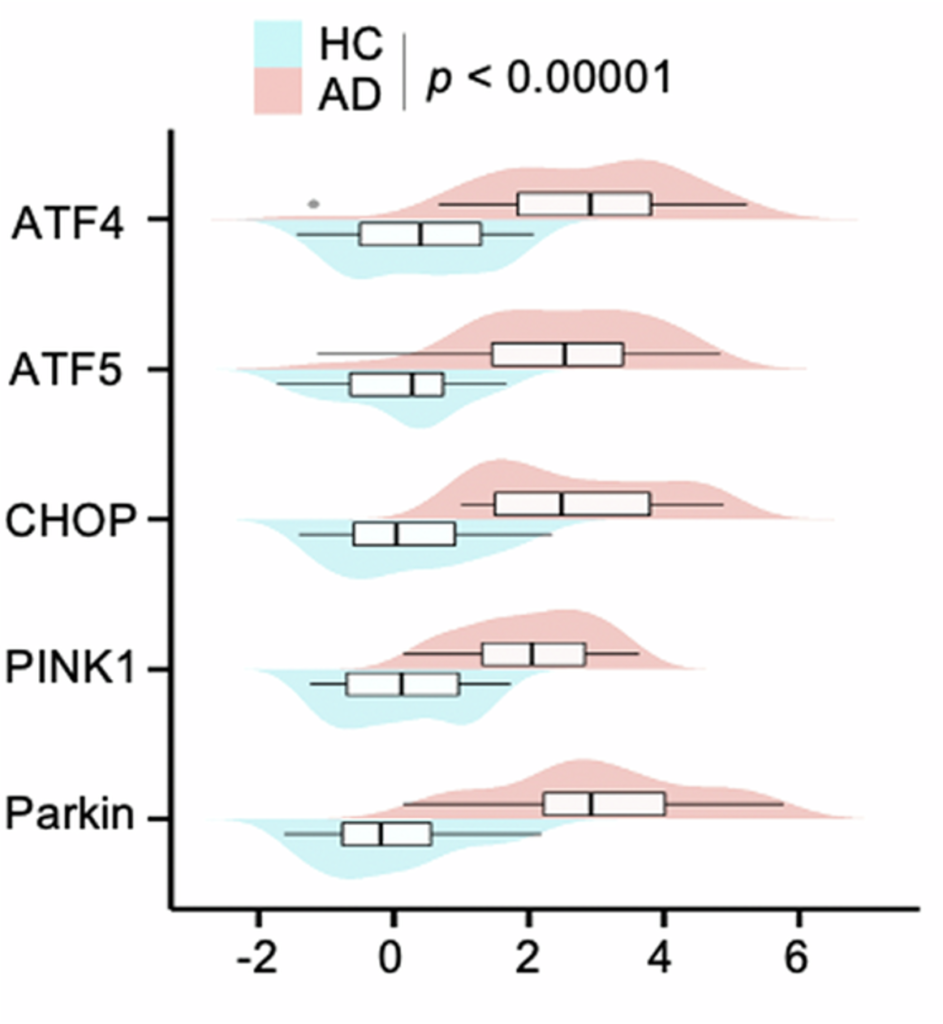NMN Helps Slow Alzheimer’s Disease Progression
Human and mouse data suggest that NMN (nicotinamide mononucleotide) could slow the progression of Alzheimer’s by targeting mitochondria.
Highlights:
- In AD patients, the mitochondrial stress response is heightened, suggesting damage to brain cell powerhouses.
- In AD mice, NMN alleviates memory loss and neurodegeneration, the primary symptom and pathology of AD in humans.
Mitochondria produce a form of energy our cells utilize to keep us alive. Per ounce, the brain has the highest demand for this energy, making mitochondria paramount in keeping our brain cells alive. This is why, in the etiology of Alzheimer’s disease (AD) — a disease caused by brain cell death and damage (neurodegeneration) — mitochondria play a fundamental role.
Recently, Harvard University professor and longevity expert David Sinclair, PhD, took to X saying,
“Alzheimer’s disease (AD) patients experience a damaging mitochondrial stress response. New study shows the NAD-booster NMN lowers the stress, neuronal loss & brain atrophy in a mouse model of AD.”
The study mentioned by Dr. Sinclair, done by researchers in China, supports the central importance of mitochondria in AD. Moreover, the study suggests that the NAD+ precursor NMN can target the putative underlying basis of AD to prevent neurodegeneration.
Mitochondrial Stress in AD Patients
To arrive at clinical relevance, the researchers analyzed blood samples from AD patients. In doing so, they observed high levels of circulating mitochondrial stress response (MRS) proteins. The MRS is stimulated by various cellular catastrophes, including mitochondrial damage and oxidative stress, both hallmarks of aging that are thought to drive biological aging. Notably, MRS includes mitophagy, the process our cells use to get rid of damaged mitochondria.
Importantly, the researchers found that the level of MRS proteins in the blood of AD patients could accurately predict AD diagnosis. Such findings suggest that AD is associated with MRS in humans. While further study is needed, the elevated levels of MRS proteins in AD patients could be a sign of a constant battle between the MRS and the various cellular catastrophes that initiate the MRS. That is, in AD brain cells, attempts by the MRS to alleviate mitochondrial damage and oxidative stress may be ongoing or futile.

NMN Slows Alzheimer’s Progression
To further investigate the nature of AD, the researchers studied mice that have been experimentally altered to harbor human genes (transgenic) associated with the hereditary form of AD. This particular AD mouse model (5xFAD) recapitulates many of the features of AD observed in humans, including memory loss and neurodegeneration. The AD mice were injected with 500 mg/kg/day of NMN into their bellies for two months to test the effects of this NAD+ precursor.
By running a series of cognitive tests on the AD mice, the researchers found that NMN treatment counteracted memory loss, a primary symptom of AD. Remarkably, the researchers showed that the memory improvements were mediated by one of the MRS proteins (ATF4), suggesting that NMN slows AD progression by mounting a successful MRS.
Furthermore, the researchers found signs of NMN counteracting the disruption of synapses — where neurons connect to communicate with each other and form memories. Additionally, NMN was shown to prevent brain atrophy, an indicator of neurodegeneration, and stimulate cellular energy production. Together, these findings suggest that NMN improves memory and halts neurodegeneration in a transgenic AD mouse model by targeting the MRS.
Implications for Humans
While the researchers found elevated levels of MRS proteins in the blood of AD patients, further studies are needed to determine how this is affected by NMN supplementation. Past studies have shown that other NAD+ precursors like NR (nicotinamide riboside) slow the progression of AD. However, in this past study, conducted in Turkey, the NR was accompanied by other compounds (i.e., L-carnitine, N-acetylcysteine, and serine) as part of a cocktail. It is unclear why more researchers have not explored the effects of single formulation NR or NMN on AD patients.
NAD+ precursors could play a preventative role in AD, the cause of which is unknown but may be related to the byproducts of modern civilization, such as microplastics, which could trigger mitochondrial damage and oxidative stress. However, further research is needed to determine if this is the case.

